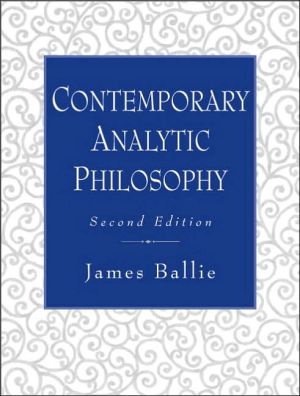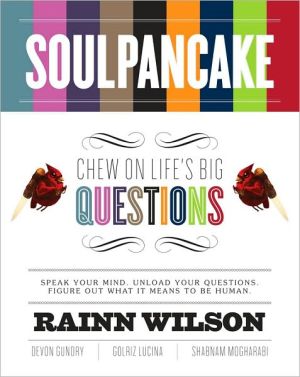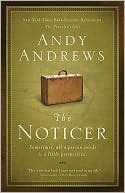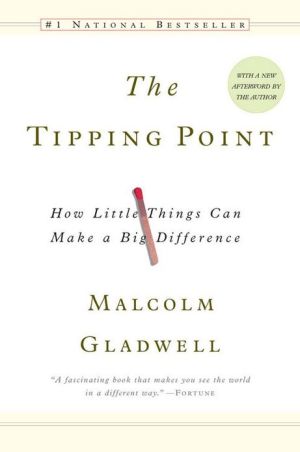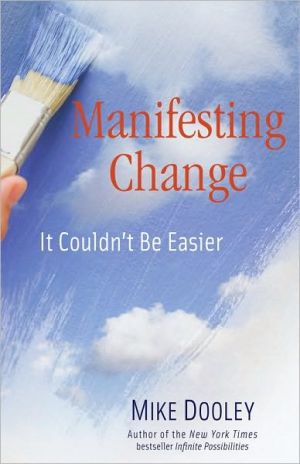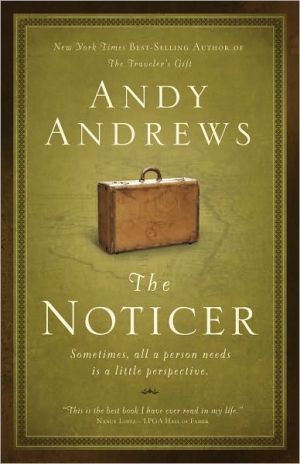Contemporary Analytic Philosophy: Core Readings
This new edition of Contemporary Analytic Philosophy retains classic works from leading philosophers such as Frege, Wittgenstein, Quine, and Kripke, and adds papers from Russell, Carnap, Strawson, Davidson, and Burge. The editor provides extensive introductions to each selection.
Search in google:
This self-contained anthology collects some of the most influential primary source contributions to contemporary analytic philosophy, together with introductions and commentaries for each selection. It traces the development of a few central themes in analytic philosophy, in sufficient detail—from philosophy of mind and language, metaphysics, epistemology, and philosophical logic.Frege, Russell, Moore. Wittgenstein. Logical Empiricism. Ordinary Language Philosophy. Quine. Truth, Meaning, and Interpretation. Reference and Essence.For anyone interested in Analytic Philosophy.
This anthology collects some of the most important contributions to contemporary analytic philosophy. Both "contemporary" and "analytic" can be given contrastive definitions. That is, I mean "contemporary" as opposed to "modern," and thus my selections are taken from the past century or so. I mean "analytic" as distinct from "continental" philosophy, though with some caveats. First, I do not want this anthology to contribute to the split between philosophy in English-speaking countries and elsewhere. This antagonism has decreased in the past couple of decades to mutual benefit. Second, some of the greatest analytic philosophers were from Europe, particularly Austria and Germany, and need to be understood against a background of philosophical activity that includes continental post-Kantian philosophy. As Michael Dummett recently remarked, "The sources of analytical philosophy were the writings of philosophers who wrote, principally or exclusively, in the German language; and this would have remained obvious to everyone had it not been for the plague of Nazism which drove so many German-speaking philosophers across the Atlantic" (1993, p. ix).\ The idea of analytic philosophy clearly rests on some notion of analysis. Analysis consists of breaking down a complex system into its component parts, thereby making the underlying elements and the relations between them explicit. The method of analysis was modeled on chemical analysis, whereby a compound decomposes into its ultimate constituents. The properties of the compound are explained in terms of its elements and their interrelations. The aim of philosophical analysis was to become clear about what was being said or thought. The new logic provided a systematic means for doing this, providing a perspicuous representation of sentences and the patterns of inference to and from each one. This, it was hoped, would prevent wooly speculation, and reveal grand metaphysical theories to be built on sand.\ While the notion of analysis was prevalent from the beginnings of the movement, the specific expression "analytic (or analytical) philosophy" entered common usage only in the 1950s. In other words, the classification is virtually retroactive, since by that time any substantive or methodological unity had long dispersed into a wide variety of approaches.\ We can identify several roots of what we now regard as the analytic tradition. First, in Germany, there was the rejection of psychologism by Gottlob Frege, as summarized in his dictum, "Always separate the psychological from the logical, the subjective from the objective:" That is, by making a strict distinction between logic on the one hand, and epistemology and psychology on the other, he separated the act of thinking from the content of thoughts themselves. Philosophy is concerned only with the latter.\ Second, in England, G.E. Moore and Bertrand Russell urged a return to the method of analysis in place of the dialectical methods of the then dominant Absolute Idealists such as F.H. Bradley and J.M.E. McTaggart (whose middle initial "M," incidentally, stood for "McTaggart"). Moore and Russell opposed "the dependence of the object of knowledge on the knower, the monism of the Absolute, the coherence theory of truth, the unreality of relations and the doctrine of internal relations" (Hacker 1998, p.15).\ Third, there was the development of formal logic and its application to natural languages, firstly by Frege and then by Russell. Frege's criticisms of psychologism were allied to his new conception of logic as the systematic study of patterns of valid inference. Russell held that ordinary language disguised the true logical form of the propositions expressed, and that this was a major cause of philosophical error.\ Russell and Moore represent two sides of an ongoing tension in analytic philosophy in the first part of this century in that they disagree over the status of ordinary natural languages. Russell follows Frege in seeing natural languages as fundamentally flawed, being subject to vagueness and ambiguity. He believed that reliable philosophical results can be obtained only by devising a logically perfect language in which the implications of any sentence could be derived by a purely formal procedure. Moore, on the other hand, had no revisionary aims concerning ordinary language and saw it as an adequate tool for achieving philosophical results, providing it is used with care.\ While all philosophers in this anthology until Quine regarded some form of analysis as central to philosophical method, they differed over precisely what was being analyzed. Moore and Russell originally held that they were analyzing facts, that is, bits of reality. This was sometimes described as the analysis of propositions, and their constituent concepts, into their basic elements. By contrast, Wittgenstein's Tractatus analyzed sentences and thought contents as a means of revealing the structure of reality. The Positivists focused exclusively on the analysis of linguistic expressions without these metaphysical ambitions. However, despite these differences regarding what was being analyzed, all these philosophers regarded analysis as a reductive enterprise, that of breaking up a complex into its simper constituent parts. The early Wittgenstein, and the Positivists following in his wake, established the view that philosophy and analysis were one and the same. Philosophy was therefore a method, not a subject matter. A strict distinction between philosophy and the sciences was thereby fixed.\ However, by the middle of the century, it had become apparent that most actual attempts at reductive analysis were failures. For example, the Positivists could not successfully formulate a reduction of statements about material objects to those concerning sense-data. Nor could their attempts to reduce discourse about mental states to talk about behavioral dispositions succeed. In the light of these failures, the reductive model of analysis came under scrutiny.\ Wittgenstein and the "ordinary language philosophers" of mid-century Oxford (represented in this anthology by Gilbert Ryle, J.L. Austin, RE Strawson, and H.P. Grice) developed nonreductive methods of analysis. The earlier reductive form of analysis can be seen as vertical, going down from complex to simpler levels, ending with unanalyzable conceptual "atoms:" By contrast, the new method was "connective analysis," to use Strawson's expression. That is, the lateral relations between concepts were explored without any attempt to reduce one concept to another. Second, they attended to how words were actually used in concrete social contexts, investigating the "grammar," or conditions of appropriate usage, of philosophically problematic concepts. This emphasis on ordinary language appalled Russell, who thought that all that would be revealed by such methods was "the metaphysics of savages:"\ One point that all philosophers in this anthology until Quine agreed on, albeit for differing reasons, was a strict distinction between philosophy and all empirical disciplines. Prior to Quine, it was held that since philosophy consists of analysis, which is a purely a priori enterprise, philosophy is therefore fundamentally different from the sciences in both its method and its subject matter. This division rested on the assumption that a clear distinction could be given between truths solely due to facts about meanings, and those resting on the way the world is. Quine's attack on the analytic/synthetic distinction undermined a hard distinction between philosophy and empirical disciplines. Indeed, his distrust of intensional notions, and his denial of any objective fact of the matter about what words mean, afforded no room for analysis, at least in its reductive form. Many, particularly in the United States, now follow Quine in regarding philosophy as being continuous with empirical sciences.\ Analytic philosophy is sometimes characterized as placing the philosophy of language in a privileged position over other branches of the subject. Hence we have Dummett's "priority thesis" whereby "we may characterize analytic philosophy as that which follows Frege in accepting that the philosophy of language is the foundation of the rest of the subject" (1978, p.441). This characterization has been widely criticized as having some clear counter-examples. Russell's account of analysis was explicitly nonlinguistic, at least in the early stages, since he and Moore were analyzing propositions, not sentences. Furthermore, both the later Wittgenstein and the Oxford philosophers would reject any hierarchical ranking between branches of the subject and so would not put the philosophy of language in any privileged position.\ Analytic philosophy is often associated with a rejection of metaphysics. However, this is extremely misleading. For example, while it is true that Moore and Russell rejected a particular metaphysical position, namely Absolute Idealism, and eschewed the speculative attitude common to nineteenth-century metaphysics in general, they could not be accused of rejecting metaphysics per se. Furthermore, the logical atomism of Russell and Wittgenstein was clearly a metaphysical thesis. The disavowal of metaphysics has more credence for the Positivists, who were explicitly hostile to it. An antimetaphysical attitude can also be ascribed to the later Wittgenstein and some of the Oxford philosophers, whose piecemeal approach of attending to everyday usage in all its variety ruled out large-scale theorizing of the sort exemplified by traditional metaphysics.\ There are no necessary and sufficient conditions for being an analytic philosopher. Any attempts at such a definition generate obvious counter-examples. With all due respect to Socrates, this is not because we don't know what analytic philosophy is. Rather, and ironically, it is because the expression does not lend itself to a reductive analysis. Most present-day analytic philosophers would regard analysis as being just one tool at their disposal. The expression "analytic philosophy" is best viewed in a Wittgensteinian manner as a family resemblance concept. Analytic philosophy itself can be considered as a "form of life" and viewed in genealogical manner. Thus, it means philosophy in the tradition of such founders as Frege, Russell, and Wittgenstein. To push the family metaphor farther, one might say that Frege and Russell begat Wittgenstein, who in turn begat both the Positivists and ordinary language philosophy, the former of whom begat Quine, who begat Davidson and many others.\ This anthology has deliberately taken a "big names" approach. That is, I have focused on those philosophers whom students must understand in order to grasp the central themes in analytic philosophy. I have also deliberately limited my subject matter to core areas such as philosophy of mind and language, epistemology, metaphysics, and philosophical logic. You will find nothing in aesthetics, ethics, or sociopolitical philosophy, for example. In each of these cases, I have judged that one or two selections (which are all that space could afford) would be misleading and less than useful. Each would require an anthology in itself, and some good ones are available.\ Of course, it would be foolish to claim that these selections comprise the essential readings in analytic philosophy. At most, it can comprise a set of such readings. However, I am confident that there will be little controversy over what I have included. There will, of course, be disagreements over what is excluded. I have chosen not to burden readers with large lists of books for further reading but have restricted myself to a few books or articles that I know, from first hand experience, are both readable and illuminating.\ I thank Ross Miller for inviting me to write this second edition. I am also grateful to the reviewers: Anthony C. Genova of the University of Kansas, John Tienson of the University of Memphis, and Philip E. Devine of Providence College, each of whom offered suggestions that have made this a better book than it would otherwise have been.
Preface1Gottlob Frege12Bertrand Russell and Ludwig Wittgenstein: Logical Atomism413Logical Positivism964Ludwig Wittgenstein: Rules and Private Language1435Ordinary Language Philosophy1736Wilfrid Sellars: Empiricism and the Philosophy of Mind2467W.V.O. Quine3078Truth and Meaning3569Reference and Essence394
